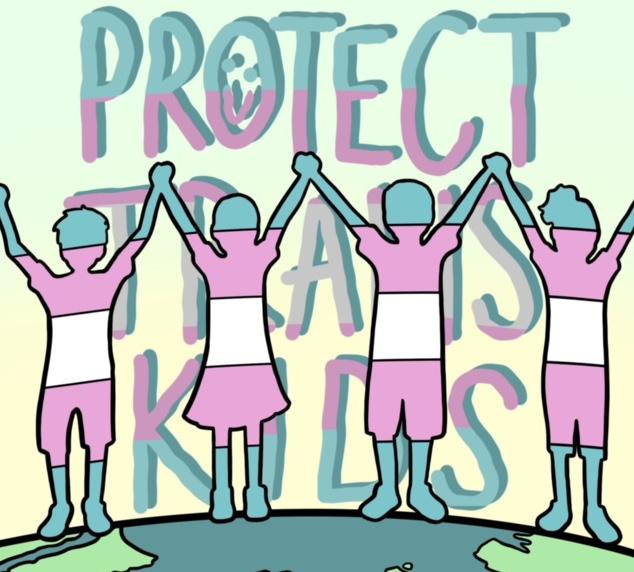
4 minute read
TRANS KIDS DESERVE BETTER
TRANS KIDS DESERVE BETTER
How international hostility is harming young trans people.
By Rachel Badham
The past 12 months have seen a surge in active hostility towards the trans community and, in particular, trans youth. From the UK High Court decision to limit access to puberty blockers for under 16s, to the 17 states in the US which introduced bills aiming to ban trans athletes from competing in school sports, aggression towards trans youth has made its way from media rhetoric to actual political action, which will affect the lives of young trans people across the globe.
2015 saw the UK Parliament hold an inquiry into trans equality, leading the government to consider the reformation of the Gender Recognition Act (GRA) and NHS gender identity services. Following contemporary prime minister Theresa May’s announcement that the GRA would be reformed and a self-declaration system would be implemented, mainstream media outlets began to weigh in, with sources such as The Times and The Sun publishing pieces describing fears over the ‘erasure’ of women’s rights in place of trans rights.

Meanwhile, in the US, Donald Trump implemented a handful of anti-trans policies, such as the trans military ban, and a moral panic over trans people was created with no evidence to back up claims that trans people posed any threat to cisgender people, women in particular.
The two international superpowers have been consistently debating trans rights for the past five years, with discourses turning increasingly hostile as public figures such as JK Rowling spread misinformation about the trans community.
After years of panic, trans youth are now feeling the impact, with regular political attacks on young trans athletes and those seeking puberty blockers and other forms of gender-affirming healthcare. Conservative politicians frame these attacks as modes to either protect cisgender youth, or protect trans youth from making decisions which they are ‘too immature’ to make, despite the volume of academic research disproving this reasoning. As trans youth are consistently being scapegoated by the media and by politicians, it is clear that this discourse has, and will continue to have, an adverse effect on the mental wellbeing of young trans people, who are already disproportionately affected by depression, anxiety, and other mental illnesses.
A September 2020 study found trans youth were at higher risk of developing mental health issues compared to other groups in the LGBTQ+ community, with Dr Julia C Sorbara, the lead author of the study, saying threequarters of young trans people who attended her clinic reported suffering from mental health difficulties. She noted that trans youth are susceptible to poor mental health, particularly during puberty, which can heighten feelings of dysphoria. Now, this already vulnerable group is constantly exposed to anti-trans rhetoric in the media, with another 2020 study finding negative media representation increases the risk of physiological distress by 28% in young trans people.
Jake Kelly, the joint head of youth work at GI, says the organisation has seen an increasing number of young trans people struggling with their mental wellbeing as a “combined result of the pandemic and the increased hostility”. Jake says young people are constantly “seeing evidence that there are people in the world who not only disapprove of their existence, but will actively fight hard to impact on their rights”, which can lead them to believe that “there is something fundamentally wrong with them.” GI hopes to educate and debunk myths surrounding the young trans community to “humanise them” and demonstrate that “they’re just young people who have basic needs”. Cara says it’s an important time for allies to show trans youth love and support, saying those who are in touch with GI are “incredibly bright, wonderful people” who deserve to have their voices heard.

Jake Chapman from Navigate Brighton, the trans masculine TNBI support group page in Brighton & Hove, says many trans people find it draining to be “continually reminded that we’re still seen as, at best, a debate or fetish and at worst, a threat”, adding that the depression and suicide rates in trans and gender diverse communities are so high due to being treated “like they don’t matter”. Navigate aims to provide a safe space for trans, non-binary, intersex and gender diverse people who are trans masculine, to address the lack of tailored support for this community.
For trans youth who are struggling, Cara suggests they “actively avoid taking part in any online ‘debate’ about their existence” and instead form positive bonds with fellow members of the community. Likewise, Jake from Navigate emphasises the importance of “having folk around you that understand at least some of what you’re experiencing”. He says it’s important to “give yourself a break” and “put the weight down sometimes” to help maintain mental wellbeing.
What is clear is that during these turbulent times where right-wing hostility towards young trans people seems to be increasing exponentially, it is paramount for trans youth to have access to safe spaces and supportive allies. Standing in solidarity with one another is more important than ever to protect young trans people from harm, and ensure they are one day treated with the respect they deserve.










